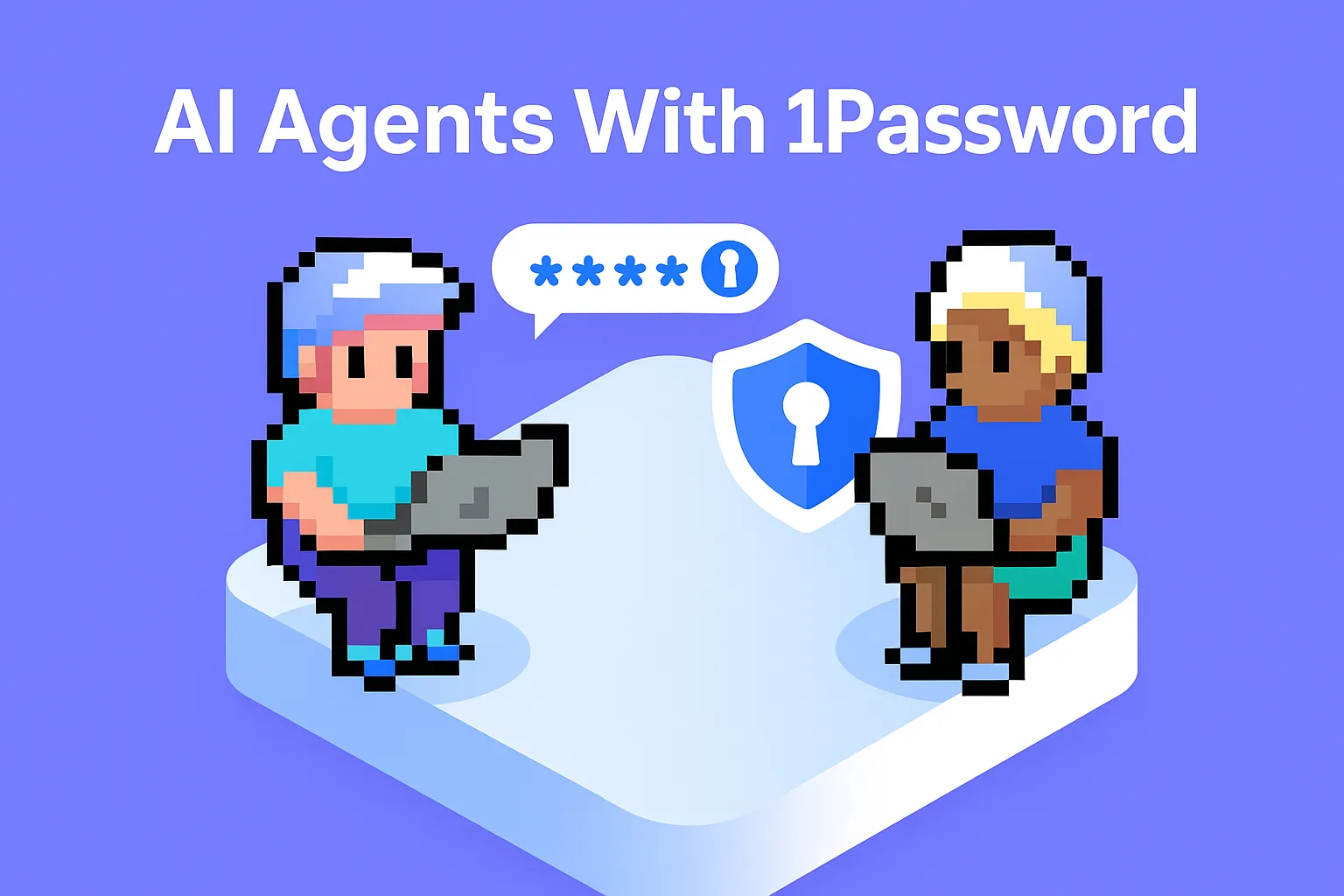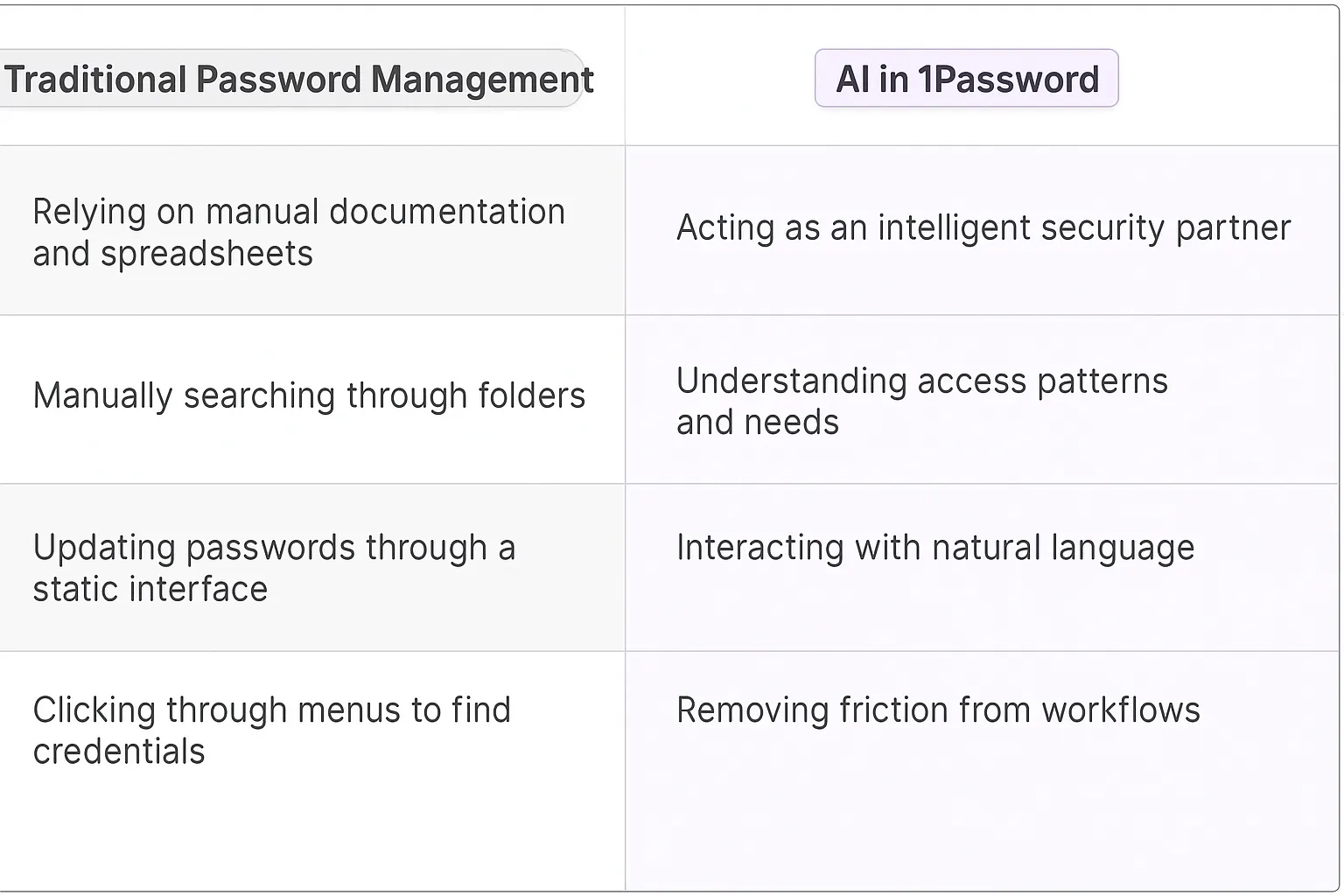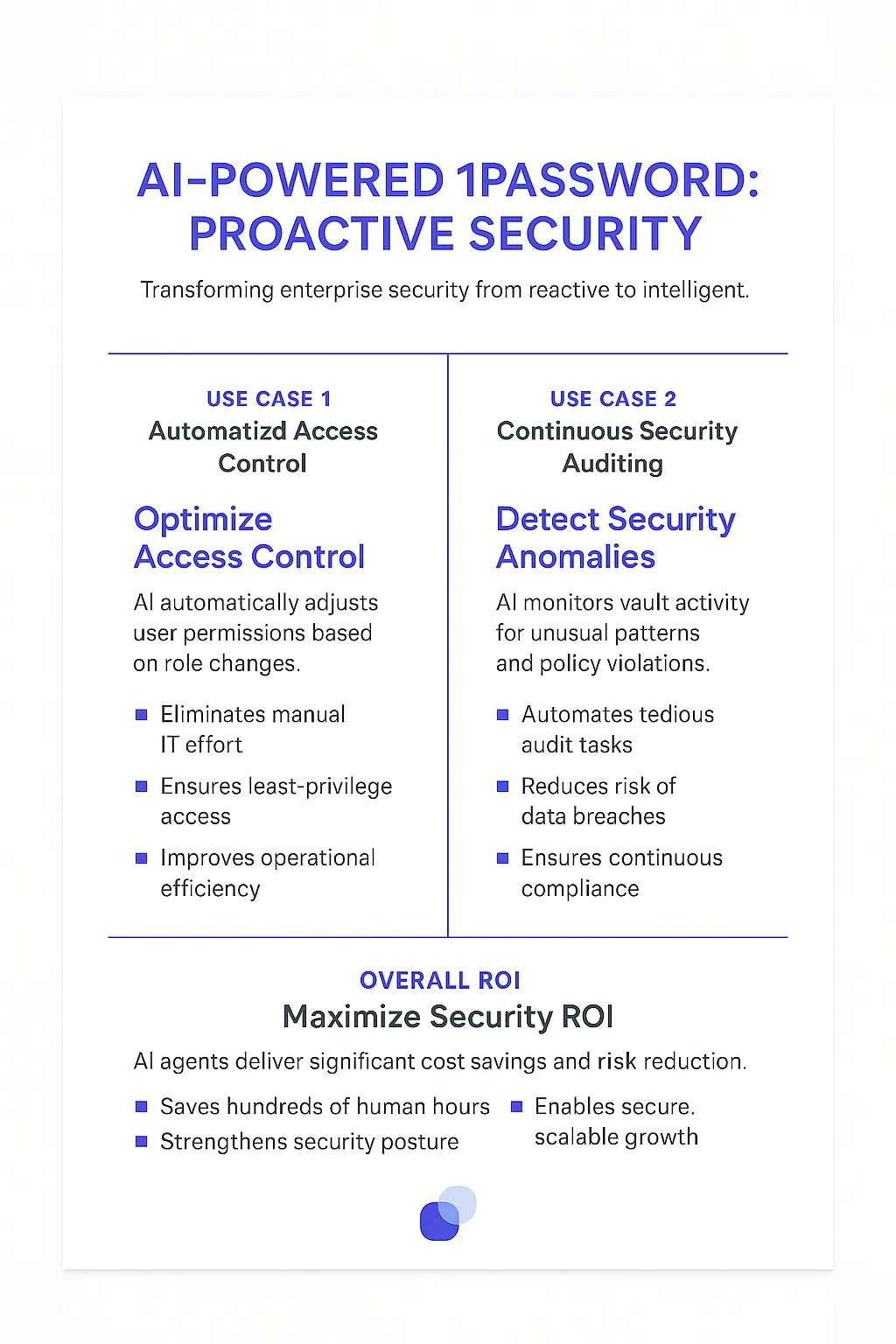1Password
Understanding 1Password's Enterprise Security Platform
1Password stands as a leading password management platform that secures digital credentials through zero-knowledge encryption. The platform provides a centralized system for managing passwords, secure notes, and sensitive documents across organizations. With enterprise-grade security features and cross-platform compatibility, 1Password serves as the backbone of access management for businesses ranging from startups to Fortune 500 companies.
Key Features of 1Password
The platform's core capabilities include encrypted password vaults, secure sharing mechanisms, and detailed access logging. Advanced features encompass biometric authentication, travel mode for cross-border security, and automated password generation. The system integrates seamlessly with popular browsers and applications while maintaining SOC 2 compliance and zero-knowledge architecture.

Benefits of AI Agents for 1Password
What would have been used before AI Agents?
Password management traditionally relied on manual documentation, spreadsheets, and basic password managers that required users to navigate through folders and categories to find credentials. Teams spent considerable time searching through vaults, updating passwords, and managing access permissions through static interfaces.
What are the benefits of AI Agents?
AI Agents transform 1Password from a static vault into an intelligent security partner. The integration creates a powerful network effect - as more team members interact with the AI Agent, it builds a deeper understanding of access patterns and security needs.
The most significant advantage comes from natural language interactions. Instead of clicking through menus, users can simply ask "Who has access to our AWS credentials?" or "Show me all expired certificates." This conversational interface removes friction from security workflows and makes password management feel less like a chore.
Security teams gain particular value from the AI Agent's proactive monitoring capabilities. It can identify unusual access patterns, flag potentially compromised credentials, and suggest security improvements based on industry best practices. This shifts password management from reactive to preventative.
For developers, the AI Agent serves as a security-aware coding partner. It can automatically generate secure credentials, rotate API keys on schedule, and ensure sensitive information stays protected across development environments. This eliminates common security gaps that occur during rapid development cycles.
The AI Agent also excels at cross-team coordination, automatically managing access levels as employees join, switch roles, or leave the organization. This automated governance reduces security risks while saving IT teams countless hours of manual permission updates.

Potential Use Cases of AI Agents with 1Password
Password Management and Security
AI Agents integrated with 1Password could analyze password strength patterns across an organization, proactively identifying weak or compromised credentials before they become security risks. The agent would monitor password databases, detecting reused passwords and suggesting unique alternatives that align with company security policies.
Access Control Optimization
Digital teammates could manage role-based access control by tracking user behavior patterns and suggesting permission adjustments. When employees change roles or departments, the AI agent would automatically recommend updates to their access levels, maintaining zero-trust security principles while reducing administrative overhead.
Security Audit Automation
AI Agents could perform continuous Security Audit by monitoring shared vault activities, analyzing unusual access patterns, and flagging potential security concerns. The system would generate detailed reports highlighting vulnerable areas and suggesting specific improvements to security protocols.
Onboarding and Offboarding
During employee transitions, AI Agents could orchestrate the complex process of granting or revoking access across multiple systems. The agent would ensure new hires receive appropriate credentials while maintaining detailed logs of all access changes for compliance purposes.
Compliance Monitoring
AI Agents could track compliance requirements across different jurisdictions and ensure password policies align with current regulations. The system would automatically flag non-compliant practices and suggest necessary adjustments to maintain regulatory alignment.
Password Recovery Enhancement
When users need to recover access, AI Agents could implement smart verification processes that balance security with user convenience. The system would analyze multiple factors to verify user identity while maintaining robust security standards.
Security Training Integration
AI Agents could personalize security training by analyzing individual user behavior patterns. The system would identify specific areas where users need additional guidance and deliver targeted microlearning modules to strengthen security practices.
These use cases represent the intersection of advanced AI capabilities with enterprise-grade password management, creating a more secure and efficient digital environment while reducing the cognitive load on IT teams.

Industry Use Cases
AI agents integrated with 1Password unlock powerful new capabilities for password management and security across multiple sectors. The intersection of AI and credential management creates opportunities that go far beyond basic password storage. By analyzing usage patterns, security behaviors, and compliance requirements, these digital teammates enhance both security posture and operational efficiency.
The real power emerges when examining how different industries leverage this technology in distinct ways - from healthcare organizations managing sensitive patient data access to financial institutions protecting high-value transactions. Each sector finds unique applications that align with their specific security challenges and regulatory frameworks.
Looking at concrete implementations across industries reveals how AI agents transform password management from a necessary security measure into a strategic asset. The following examples demonstrate how organizations are putting this technology to work in ways that directly impact their bottom line while strengthening their security infrastructure.
Healthcare Industry: Securing Patient Data with 1Password AI Agents
Healthcare organizations face mounting pressure to protect sensitive patient data while maintaining rapid access for authorized personnel. The integration of AI Agents with 1Password creates a powerful shield for healthcare providers managing thousands of credentials across Electronic Health Record (EHR) systems, medical devices, and telehealth platforms.
A mid-sized hospital network managing 500+ physicians and staff can deploy 1Password AI Agents to monitor credential usage patterns and automatically flag unusual access attempts. When a nurse practitioner attempts to access patient records from an unrecognized device or location, the AI Agent immediately triggers additional verification steps while logging the activity for compliance records.
The AI Agent's pattern recognition capabilities extend beyond basic security. By analyzing how medical staff access different systems throughout their shifts, it can proactively generate role-specific credential vaults. For example, emergency department staff receive instant access to time-sensitive systems, while billing department employees get streamlined access to insurance portals.
HIPAA compliance remains a critical concern for healthcare providers. 1Password AI Agents continuously monitor password strength, credential sharing, and access patterns to maintain audit trails. When potential compliance risks emerge, such as shared login credentials between departments, the AI Agent alerts security teams and suggests corrective actions.
This intelligent approach to healthcare credential management reduces security risks while allowing medical professionals to focus on patient care rather than wrestling with multiple login systems. The ROI becomes clear as healthcare organizations see fewer security incidents and stronger HIPAA compliance scores.
Financial Services: Strengthening Digital Asset Security Through AI-Powered Authentication
The explosion of digital assets and cryptocurrency trading has created unprecedented security challenges for financial institutions. Leading investment firms are turning to 1Password AI Agents to protect billions in digital assets while maintaining lightning-fast transaction capabilities.
A global cryptocurrency exchange handling $500M in daily trading volume demonstrates the transformative impact. Their 1Password AI Agents analyze thousands of login attempts per second, building sophisticated behavioral profiles for each trader and administrator. When the AI detects anomalous patterns - like simultaneous login attempts from different countries or unusual trading hours - it automatically escalates security protocols.
The AI's adaptive learning shines in detecting sophisticated attack patterns. Rather than relying on static rules, it builds dynamic risk profiles based on hundreds of variables. For instance, when a trader who typically executes small Bitcoin transactions suddenly attempts to move large amounts of Ethereum, the AI Agent triggers additional verification steps while alerting the security team.
Regulatory compliance in financial services requires meticulous documentation. The AI Agents maintain detailed audit trails of all credential usage, automatically generating reports that satisfy SEC requirements. When potential compliance issues arise, like shared trading accounts or irregular access patterns, the system flags them for immediate review.
The metrics tell a compelling story: Financial institutions using 1Password AI Agents report 90% fewer security incidents and 60% faster threat response times. For digital asset firms where every second of downtime can cost millions, this level of intelligent security automation delivers massive value while keeping assets protected.
Considerations and Challenges
Implementing AI agents within 1Password's security infrastructure requires careful navigation of both security protocols and user experience demands. The intersection of AI capabilities and password management creates unique complexities that organizations must address head-on.
Technical Challenges
Security boundaries represent the primary technical hurdle. AI agents need enough access to be useful but must operate within 1Password's zero-knowledge security model. This creates a complex balance - the AI requires data to function effectively, but accessing sensitive password data could compromise 1Password's core security promises.
Authentication flows present another significant challenge. The AI agent must seamlessly integrate with 1Password's existing authentication mechanisms while maintaining the platform's stringent security standards. This includes handling biometric authentication, two-factor verification, and master password requirements without creating new attack vectors.
Operational Challenges
Data privacy compliance becomes more complex when AI enters the equation. Organizations must ensure their implementation adheres to GDPR, CCPA, and other regional data protection regulations. The AI agent's data processing activities need clear documentation and user consent mechanisms.
User trust represents a critical operational consideration. Password managers hold extremely sensitive data, and users may be hesitant about AI systems having any level of access to their credentials. Clear communication about security measures, data handling practices, and AI limitations becomes essential for maintaining user confidence.
Version control and updates require careful orchestration. The AI agent must maintain functionality across different versions of 1Password while adapting to new security patches and feature updates. This demands robust testing protocols and fallback mechanisms to prevent disruption to critical password management functions.
Integration Considerations
Enterprise environments need special attention during implementation. The AI agent must work seamlessly with existing identity providers, SSO solutions, and admin controls. Role-based access control becomes more nuanced when AI systems can potentially access organizational password vaults.
Performance impact requires careful monitoring. The AI agent should not significantly affect 1Password's core operations, including vault access times and autofill capabilities. Organizations need to establish performance benchmarks and monitoring systems to maintain optimal user experience.
AI-Enhanced Password Security: A New Era of Digital Protection
The integration of AI Agents with 1Password marks a significant shift in how organizations approach password security and access management. By combining intelligent automation with robust security protocols, this technology enables organizations to maintain stronger security postures while reducing administrative burden. The demonstrated benefits across healthcare, financial services, and other sectors show that AI-enhanced password management isn't just a technological advancement - it's becoming a competitive necessity for modern businesses focused on protecting their digital assets.
Organizations implementing these solutions are seeing tangible improvements in security metrics, compliance adherence, and operational efficiency. As AI capabilities continue to evolve, we can expect even more sophisticated applications that further strengthen the bridge between security requirements and user experience. The future of password management clearly lies in this intelligent, adaptive approach to security.













